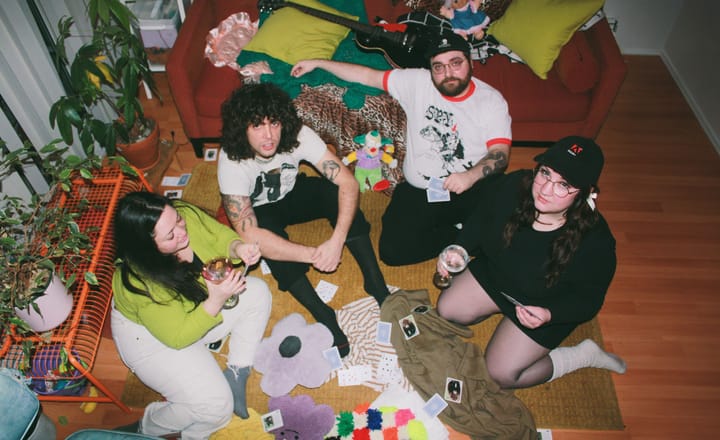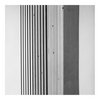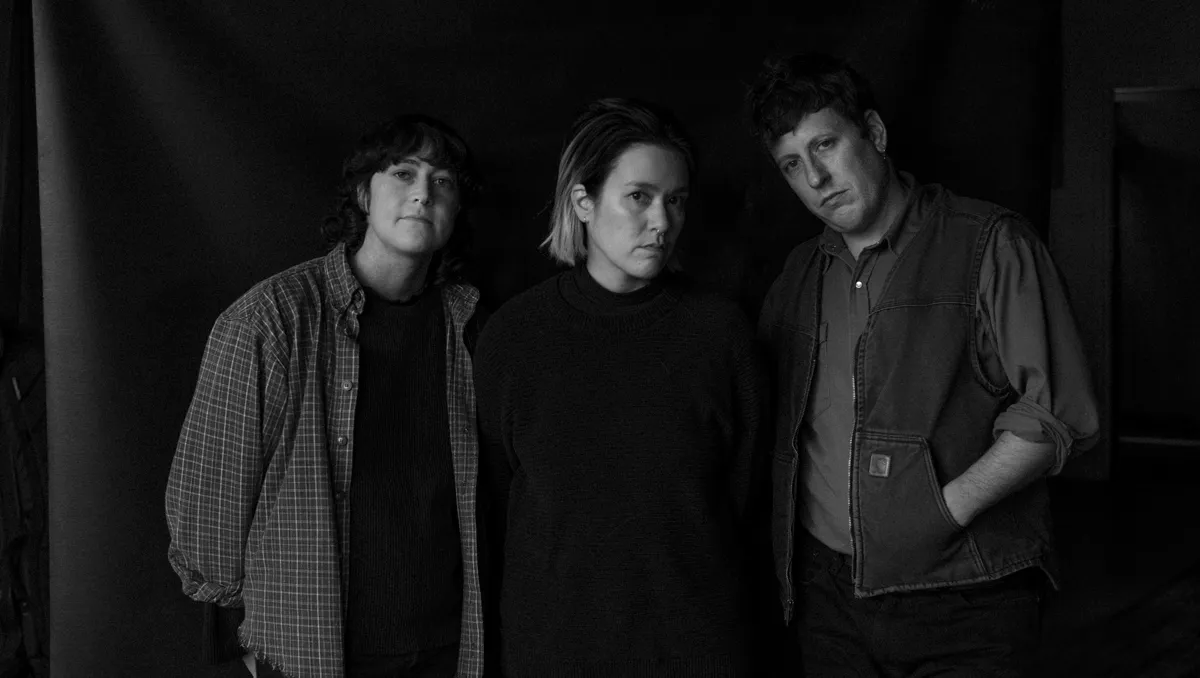
Wood, Wire, and Willpower: BIG | BRAVE Patch the Circuit
Mathieu Ball and Robin Wattie know the clock is ticking. “Making records, or going on tour, I always feel like this could be the last time,” Ball says. “Every single time,” echoes Wattie. Now more than a decade on, with their eighth full-length album due in April, the founders of minimalist drone-rock outfit BIG | BRAVE still struggle to break even, and the pair are painfully aware that it could end at any moment.
Archetypal Montrealers, Ball and Wattie depend on art practices external to the band to make ends meet between tours — Wattie as an illustrator and tattoo artist, Ball a solo guitarist, woodworker, and photographer. Both are deeply cognizant of their position within the broader political economy of a city beset by decades of decline.
“We’re able to make so many records, and tour so much, because we’ve managed to keep the cost of living down,” Ball tells me. “Fighting the landlords, trying to keep the rent down, that’s part of it too.”
“We’re actively choosing to do this, to stay here specifically,” says Wattie. “It’s not easy by any means. It’s just the reality, and we’re holding on for dear life to do this.”
We meet to talk during the aftermath of an historic snowstorm which effectively shut the city down for nearly a week, discussing what it means to build communities and lives as working artists, while rents increase, the planet warms, and late capitalism teeters on the edge of collapse.
“I really love doing this,” Ball says, “and if it stops I will be heartbroken. So, let’s just keep going. That’s why there’s a record every year. Because it’s going to end.”
BIG | BRAVE’s moody, ear-splitting full-band compositions have often been pigeonholed as some iteration of “metal” — a label Wattie and Ball categorically reject — but for OST, their forthcoming album, they’ve left the guitar squalls and Tasy Hudson’s pounding drums entirely behind. Instead, the trio cede the spotlight to a homemade assemblage of discarded piano innards and detritus from Ball’s wood shop, fittingly dubbed “the instrument,” along with various secondary studio instruments and fragile, wordless vocal articulations. It’s an austere and demanding listen, closer to a Pauline Oliveros meditation than Sunn O))).
On its surface, OST may appear an about-face, but to Ball and Wattie, it’s probably the closest they’ve yet come to the founding ethos of the band. “It seems like it’s a left turn,” says Ball, “but really it just makes sense I think.”
When asked about their influences, Wattie immediately references the pantheon of minimalist composition: John Cage, Terry Riley, Steve Reich, Arvo Pärt, and Tony Conrad.
“We’ve always been listening to this kind of stuff,” Ball insists, “We just happen to make rock music. With this one I feel like we’re just making the music that we’ve always been listening to.”
Wattie says they’ve always wanted to do a “painfully minimalist” project like this one, and they’re grateful to have had the opportunity to do so at this point in their career. Much of this has to do with their relationship to Chicago’s venerable Thrill Jockey records, where they’ve found safe harbour in recent years. The label is renowned for its eclecticism, an ideal fit for BIG | BRAVE’s aesthetic ambitions.
“In one week they announced the Sumac and Moor Mother record, and then Emptyset, which is like high electronic music, and then a Myriam Gendron thing,” Ball enthuses. “I love it so much.”
Their initial outing with the label was a 2021 collaboration with legendary noise duo the Body, yielding a suite of folk-leaning rock tunes which “opened some conceptual doors” for BIG | BRAVE. Since then, the steadfast support of Thrill Jockey founder Bettina Richards has given the band room to lean into more experimental minimalist tendencies than the more standardized rock band structure had allowed for.
The band’s close relationship with recording engineer Seth Manchester, based at Machines with Magnets in Pawtucket, RI, was another crucial factor in the making of OST.
“He’s the fourth member of the band,” says Wattie. “He’s family.”
Indeed, it’s these relationships that make any of it possible for BIG | BRAVE. Though rooted in and defined by their hometown, the band is sustained by their embeddedness in an international community of like-minded artists and fellow travelers, “a spider-web of connections spanning across continents,” as Wattie puts it, “sparse but definitely a web.”
The duo speaks with equal familiarity, reverence, and warmth of the connections they have to the independent music scene in Tallinn, Estonia and to now-defunct Montreal D.I.Y. space La Plante.
“It’s actually just tender, soft, big-hearted, genuine people. Regardless of where they are in the industry: that is the community,” Wattie continues. “You find community in people that you feel an organic connection to, you recognize certain aspects that you value in them, and they recognize certain aspects that they value in you.”
We talk about the necessity of connection and community in keeping such a ship afloat, as so much of the infrastructure that once enabled independent and DIY artistic production in previous decades — labels, venues, publications — finds itself increasingly embattled. I ask whether the ethical frameworks of that cultural moment still feel meaningful, and Wattie and Ball both become animated, describing a tension between the thirst for fierce autonomy as creators and the necessity of social interconnection as human beings.
“I think that when there are people doing the DIY thing, if anything it becomes more meaningful. I feel people are way more passionate about it now because it’s so bleak out there,” Wattie replies. “There’s DIY bands still out there, but not nearly in the same capacity as what it used to be, before independent music became a genre.”
“I think in our approach, sonically, we’re not a DIY punk band,” says Ball, “but I think we actually are a DIY punk band, because of this record also: we just do whatever we want. My approach to music is like, fuck everything, make an instrument, do this, do that. That definitely informed my approach, my attitude towards it.”
“I only started playing music in my mid-20s,” Wattie tells me. “Pretending to know what I was doing. Everything I do is fucking new and it’s a big challenge.”
She connects this independence of spirit to her experiences as a racialized woman amid the ubiquity of white maleness in the heavy music scene: “When I first started out touring in the heavy music scene, I was the only person on stage that looked like me. And there might have been one or two other people in the crowd, maybe. Maybe. It was like that for fucking years, and I get choked up about it still, because it was such a huge challenge. I literally had to argue and elbow my way into having space for myself.”
OST, she tells me, is “kind of a fuck you, I can do whatever I want.”
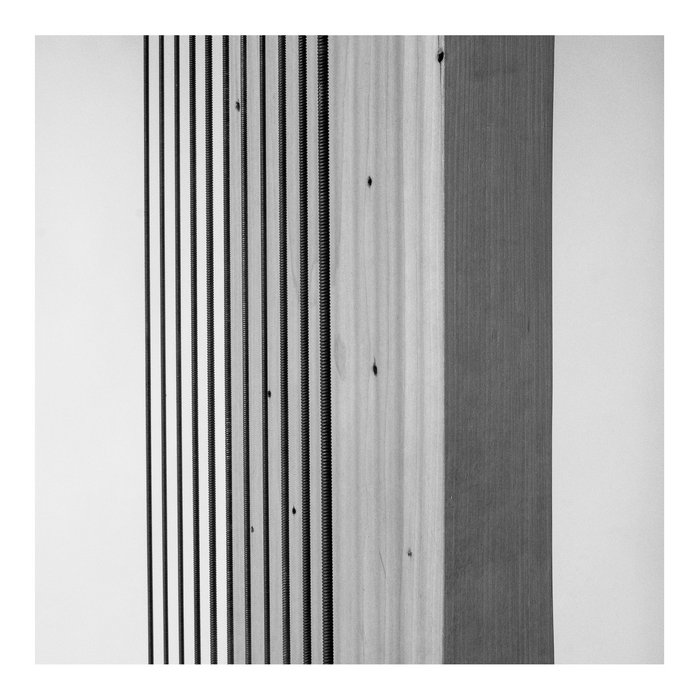
While their approach to creative work is exploratory, iterative, and bespoke, BIG | BRAVE’s work ethics are rooted in the humble pride of people who’ve given years of their lives to wage labour in the construction and service industries.
“I think that’s why we see eye to eye on this,” Ball suggests. “We’re workers. The alternative is, I dunno, lifting drywall again.” Wattie concurs: “We’re hustlers. We don’t have a choice. The alternative is pulling beers and serving hoity-toity customers.”
“I’d rather be poor and get to do this,” says Ball.
“I’ve always been poor,” Wattie chimes in. “So this is like, I’m poor but doing something I love to do. I’ve only ever been poor doing things I hated, so it’s a big deal. I’m counting my lucky stars for however many years I’ve been able to just do the band and tattoos.”
This spirit is reflected in the urgency and the sense of stakes inherent in their work as a band: BIG | BRAVE don’t have time to fuck around, which in a sense makes the studio hours and resources they devoted to creating OST even more precious. We note that these hours fell in late October 2023, as the devastating scale of the genocide in Gaza was still revealing itself, and we would see each other at benefit shows and solidarity marches in downtown Montreal.
I ask about what kind of ideas or preoccupations lie behind the lyric-less work on the new record.
“It’s pretty abstract,” Ball replies, “but I feel like the main theme is just about getting in a room with people you love and doing things, even though everything is so fucked. The other records are a bit more political, but this one, maybe it’s the action of it.”
“If I were to attribute some kind of meaning, it was a practice: I am putting into practice this idea of finding people that are family and that are safe, and making a safe haven, finding solace in that,” Wattie says. Over email, she later adds, “If something evokes or provokes a feeling or a thought, however positive or negative, that holds meaning. Perhaps it wouldn’t hold meaning if the listener was apathetic – then it wouldn’t mean anything.”
Looking around Montreal, it’s not difficult to feel like we’re all living on borrowed time. The infrastructure seems a day away from collapse, the unhoused population has nearly doubled since the start of the pandemic, and this year’s rental increase guidance is the highest it’s been in 30 years. The state is showing itself to be increasingly incapable of — if not to say actively uninterested in — ensuring a decent life for the most vulnerable: unhoused and poor folks, people living with disabilities, the elderly (with all these vulnerabilities exacerbated along lines of race and gender). Insofar as experimental and iconoclastic art makers have always found themselves on the fringes of the socioeconomic mainstream, even that liminal space seems to be receding apace.
We’re all feeling it, this creeping anxiety in the air: political, economic, existential. I ask BIG | BRAVE what it’s possible to focus on in times like these.
“The things you care about,” says Ball, “and the people you care about.”
“There’s nothing else,” Wattie emphasizes.
Read more
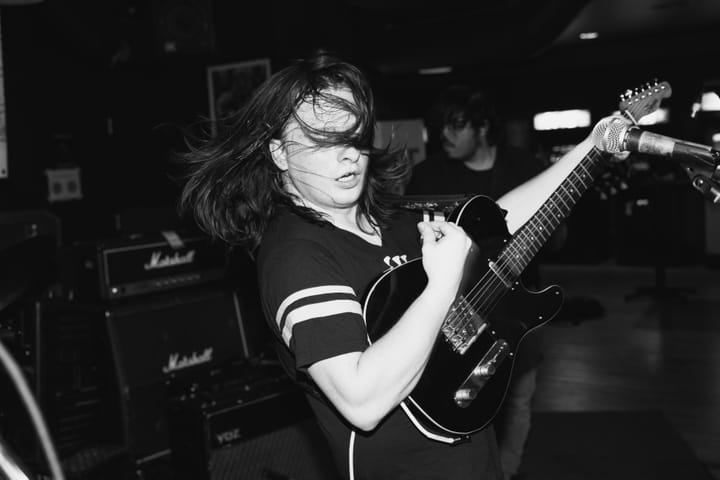
Sentries: Multifaceted Noise Rock
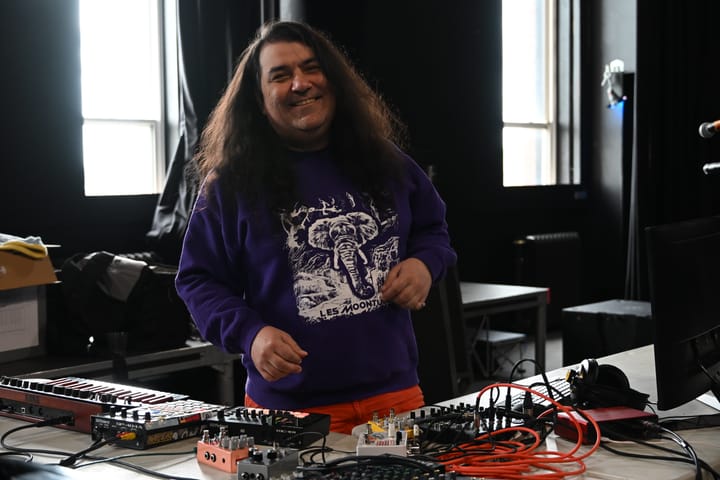
Step Into Little Stone Crow's World
